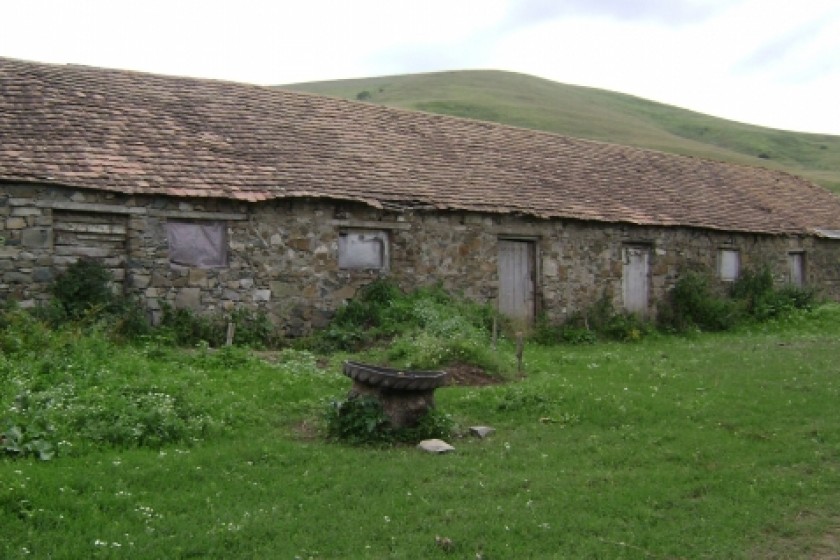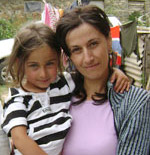
Karmir Gyugh: Residents of this Remote Village Communicate by Letter
If you travel through the hills and dales some 10-15 kilometers distance from the town of Noyemberyan, you’ll come across some former state collective farms. These former workhorses of Soviet agriculture are now inhabited and have been turned into villages of sorts. They have no official status nor do they have any village mayors. The land doesn’t belong to the new residents who have simply divvied up the area amongst themselves. Each of these small outposts has a name. One of them is called “Karmir Gyugh” (Red Village).
“Here, there is no bickering or quarreling amongst residents. We all help each other out. This is what sets us apart. We come to the aid of others,” says Karmir Gyugh resident Stepan.
Cooperation rather than confrontation
When we arrived at the village only three families had stayed behind; the rest having taken their livestock to graze higher up in the mountains.  69 year-old Grandpa Armen said, “People mostly make a living off the animals. Starting in May, they take the animals higher up to graze. There are some wooden cabins up there where the villagers stay till September. During those months the grass is cut and collected for the winter. One half of the villager’s life is spent up in those mountains.” The old “kolkhoz” storage bins are now used as animal sheds. Many of the new residents have built themselves stone houses to replace the original wooden ones. “I really couldn’t tell you why they name this collective farm Karmir Gyugh; but they did,” Stepan says. Some of the villagers also keep bees and sell the honey produced. The fruits and vegetables grown in the garden plots aren’t sold. “What we grow is barely enough for ourselves let alone to sell,” says Stepan. There are no stores in the village. Many residents have cars and drive into Noyemberyan to buy whatever they may need. Those without transportation merely make a list of what they need and hand it to a neighbor or friend.
69 year-old Grandpa Armen said, “People mostly make a living off the animals. Starting in May, they take the animals higher up to graze. There are some wooden cabins up there where the villagers stay till September. During those months the grass is cut and collected for the winter. One half of the villager’s life is spent up in those mountains.” The old “kolkhoz” storage bins are now used as animal sheds. Many of the new residents have built themselves stone houses to replace the original wooden ones. “I really couldn’t tell you why they name this collective farm Karmir Gyugh; but they did,” Stepan says. Some of the villagers also keep bees and sell the honey produced. The fruits and vegetables grown in the garden plots aren’t sold. “What we grow is barely enough for ourselves let alone to sell,” says Stepan. There are no stores in the village. Many residents have cars and drive into Noyemberyan to buy whatever they may need. Those without transportation merely make a list of what they need and hand it to a neighbor or friend.  “We have a small ‘tonir’ where everyone can bake bread. The concept of ‘mine and yours’ doesn’t exist here. We all look out for one another,” says Grandma Nelli. Just a few families stay in Karmir Gyugh during the cold winter months. Most go to Noyemberyan or other nearby villages. Some families only come to the village for a bit of rest and relaxation.
“We have a small ‘tonir’ where everyone can bake bread. The concept of ‘mine and yours’ doesn’t exist here. We all look out for one another,” says Grandma Nelli. Just a few families stay in Karmir Gyugh during the cold winter months. Most go to Noyemberyan or other nearby villages. Some families only come to the village for a bit of rest and relaxation.
A taste of buffalo yogurt
“Life is hard here but we’re healthy due to the clean air and pure water. The diary products and meat we eat is home-grown and the fruits and veggies come from the land we work. And the honey we eat is the real deal,” says Grandma Anna, inviting us to taste some of her buffalo yogurt. The comforts of modern-day life have yet to reach Karmir Gyugh. There is no electricity, indoor plumbing or water, and the village is out of cell phone range. Residents don’t complain much about not having electricity since they’re out of T.V and radio range anyway. The natural beauty of the place makes up for these inconveniences and the clever villagers have found the solution to the telephone problem. “If you go to the top of that mountain you can connect with ArmenTel and Viva Cell is accessible on the top of that other one,” says grandpa Armen. Many villagers, though, prefer communicating with the outside world by letter-writing rather than climbing mountains.  “We collect the letters and give them to anyone driving into town to deliver to our families or friends. We have a car as well but my husband drives it in town for work. There is much that we go without here but with the help of our neighbors we live a fairly regular life,” says Armineh. As she tells us this she hands over her cell phone to a neighbor who’s driving into town. The phone’s battery needs recharging.
“We collect the letters and give them to anyone driving into town to deliver to our families or friends. We have a car as well but my husband drives it in town for work. There is much that we go without here but with the help of our neighbors we live a fairly regular life,” says Armineh. As she tells us this she hands over her cell phone to a neighbor who’s driving into town. The phone’s battery needs recharging.
 Videos
Videos Photos
Photos
Write a comment